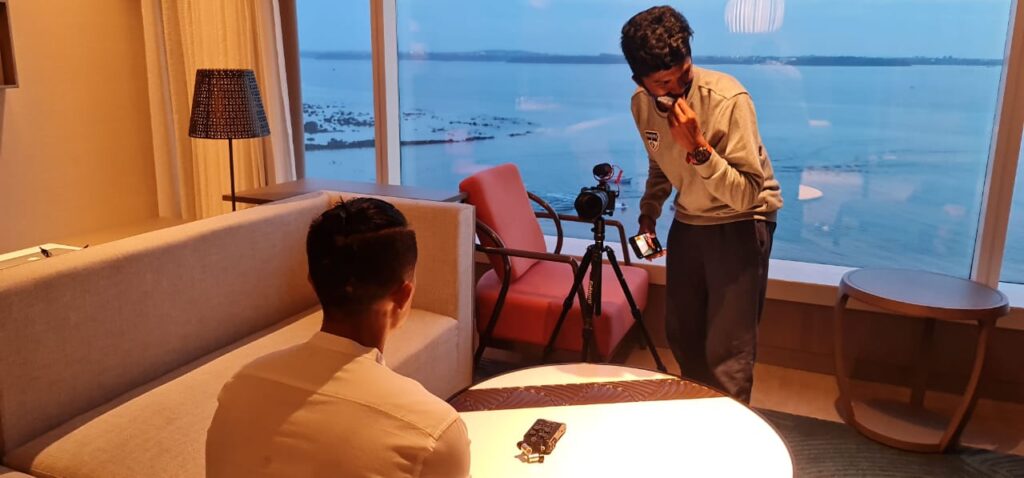Sunil Chhetri, along with the rest of his teammates at Bengaluru FC, wakes up every morning to a beautiful view at the tempting Vainguinim beach.
The captain of India’s football team and the second highest international goal-scorer amongst active footballers – ahead of Lionel Messi and behind Cristiano Ronaldo — is living his life inside a bio-secure bubble just like the other sportspersons these days.

Ever since the coronavirus pandemic brought the sporting world to a halt, the bio-secure bubble has become the norm. It’s an artificial environment cut off from the contact of the outside world. This bio-secure bubble is a world in itself where there is no place for anyone besides players, officials and the support staff. This is a system made for everyone’s safety, a measure to minimize the risk of contracting COVID-19 and jeopardising the league or tournament.
The United States, China and Australia all started to get the benefits of bio-secure bubbles to restart their football leagues. For India, the cricket board or BCCI considered succumbing to the concept of living in a bubble when they decided to shift the lucrative Indian Premier League (IPL) T20 cricket tournament to the United Arab Emirates in September last year.
Football Sports Development Ltd (FSDL), the body that organizes the Indian Super League (ISL), surprised the sports enthusiasts when a decision was made in July last year to go ahead with a full-fledged league, comprising 115 matches, spread across four months.
At a time when India was running scared of Covid-19, the organizers assembled all the 11 teams in Goa and decided to have the league in one state. Of course, with everyone inside a bubble. However, living in a bubble has not been an easy experience for the players.
“It might seem like a good life at a five-star resort but when you get inside, you realize just how difficult it is. If results don’t go your way, then it gets even more taxing,” says Kunaal Majgaonkar, media officer for Bengaluru FC, who has his room next to Chhetri’s.

Video shoots for the club’s in-house requirements are all done indoors. Here, Bengaluru FC captain Sunil Chhetri readies for a shoot
So, when not playing football, how do players spend their time, within themselves, away from the outside world?
Let’s start with the recreational room. There are indoor games such as carom, table tennis and poker in the recreational room. There’s also a swimming pool.
“We wake up to a beautiful view of the beach every morning. Unfortunately, we can only admire the beach from a distance. It’s like a carrot dangling; you cannot reach it. For recreational activities, we play games among ourselves and I’ve turned my room into a house. If it’s music, they all head to my place,” says Kunaal.
For the games, it’s Chhetri’s expansive room, while most can be found in manager Roswell da Cunha’s room if they are watching a live European football game on television.
The entire Bengaluru FC squad is housed on the first floor of a luxurious hotel on the outskirts of Panaji, Goa’s capital city, and have no contact with anyone besides those inside the bubble, which include the hotel staff who serve only them.
Even while moving for training, the team uses the back-exit gate where a bus is ready to ferry them to the training venue, half an hour away.
“We do not use the lifts. We have to use the fire exit to get to the gate and then out for either training or competition,” says Ravi Puskur, director of football at FC Goa, the Goan franchise in the ISL.
Puskur’s Goa is in the same hotel as Bengaluru, on the second floor, with the added luxury of having access to the roof top where players head for a smoke, and some fresh air.
“Nobody from outside the bubble can come close to us. There is barricading everywhere. The security officer ensures that nobody crosses the line. We have dedicated staff. From the hotel alone there are 15 serving staffs including F&B, housekeeping, security, duty manager,” says Puskur.
Even with players, officials and the selected staff inside the bubble, there is no escaping the mandatory test for COVID-19 till the ISL final on March 13. Every third day, there is an official who shows up outside the players’ room and gets them tested.
If any player tests positive, he is immediately sent into quarantine for 14 days along with the ones in his close contact.
“It is difficult, but when people are dying outside, we are grateful to be healthy first and do our job. Most important thing is that family is healthy. We are privileged to be healthy first and play,” says FC Goa’s Spanish striker Igor Angulo, who is leading the race for the Golden Boot in ISL with 12 goals.
Simon Colosimo, deputy general secretary for FIFPro, the worldwide representative organization for 65,000 professional footballers, is concerned for the wellbeing of the players.

“Players around the world have committed in some way or the other. The important thing is that in and around, there is support for their mental well-being, there is support to ensure their families are safe, whether they are with them or not.”
“You have to go into the bubble for months, be there, play games and be removed from the rest of the society. It’s a difficult situation for anyone,” says Colosimo.
Ask any of the players and they would nod in agreement.
Story by Marcus Mergulhao ; Edited by Ritu


2 Comments
The new normal in the pandemic times is so well explained in the article. Was an engaging and exciting read.
Marcus, congratulations.
It iis indeed a very well written article depicting the conditions on how these sportsmen need to stay in bio-secure bubble for months together.
Though the lives of these sportsmen appears to be quite lucrative for common people, they do have their own share of odds.